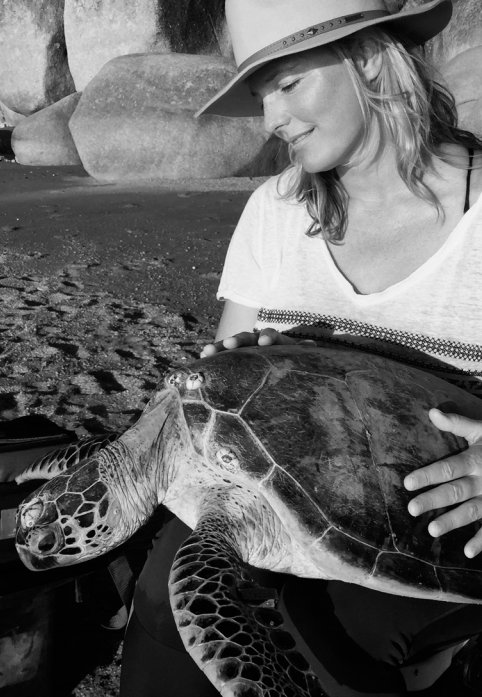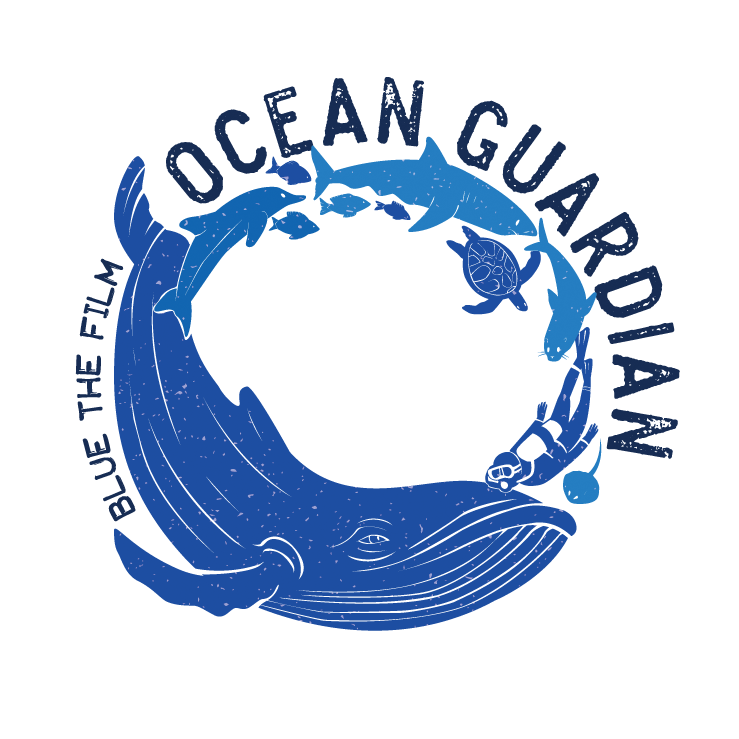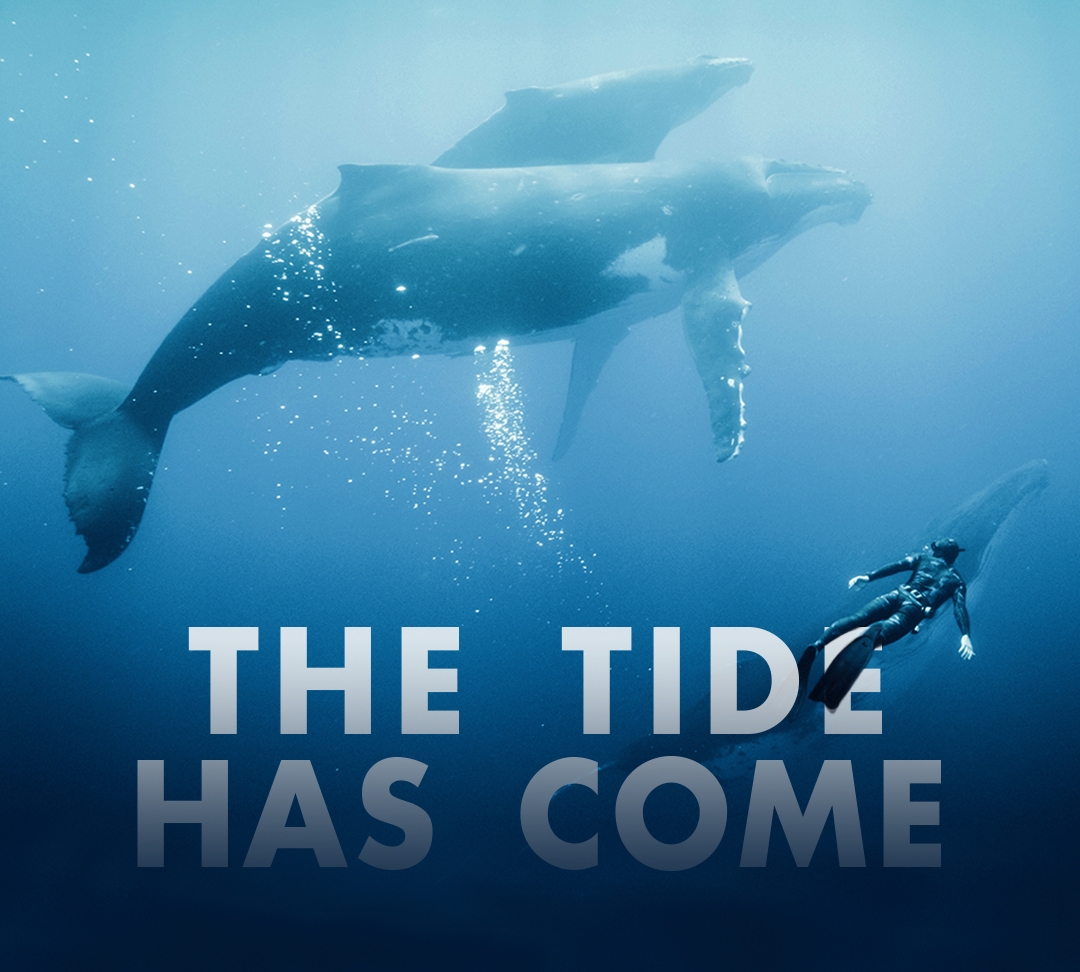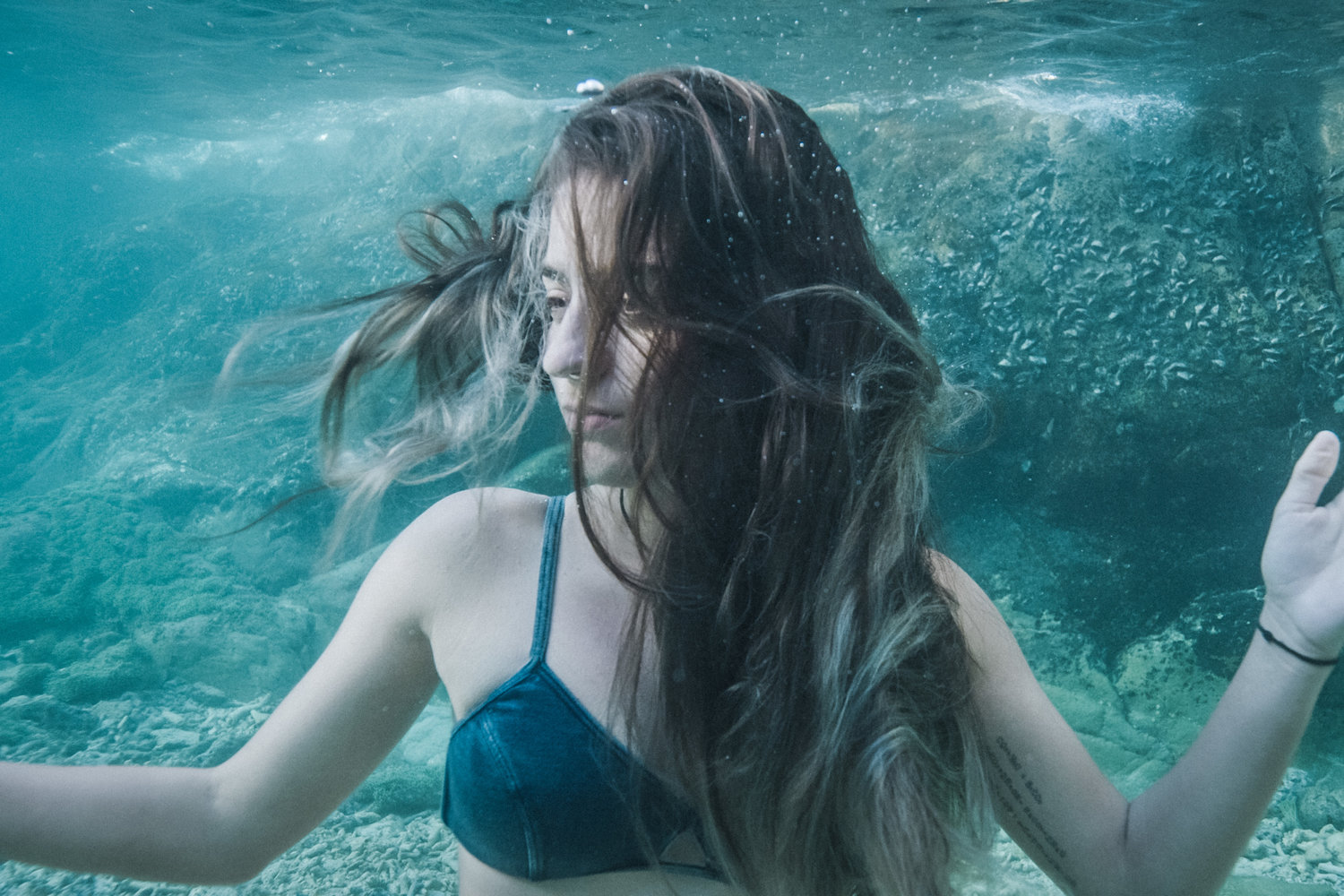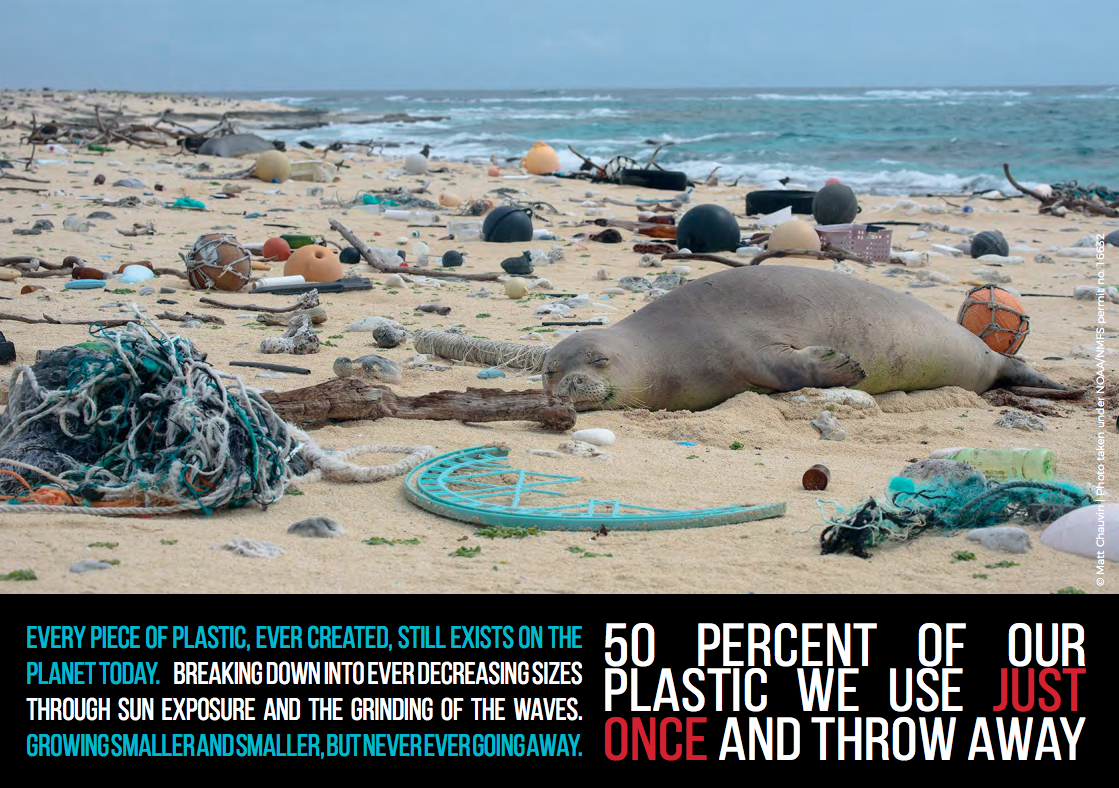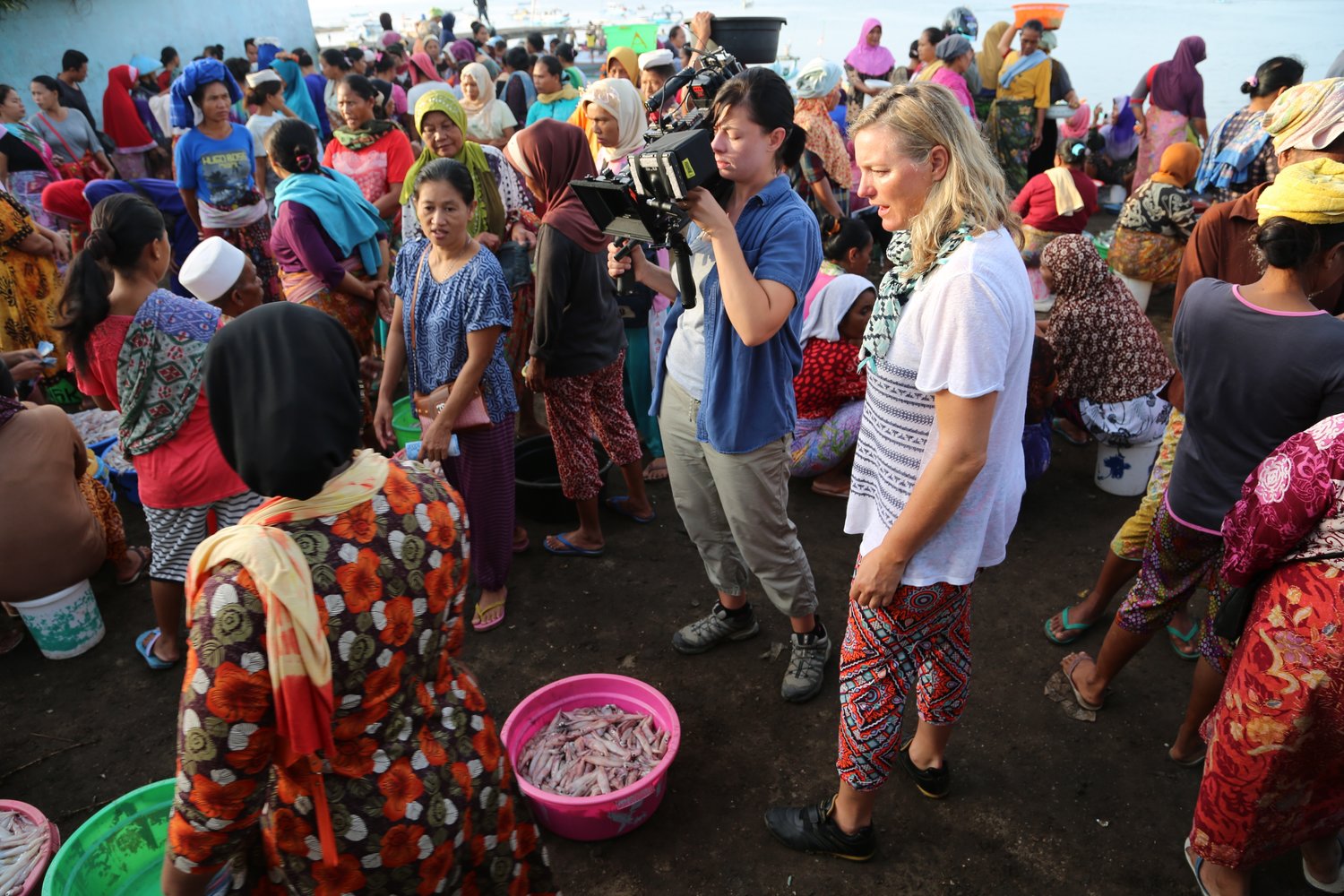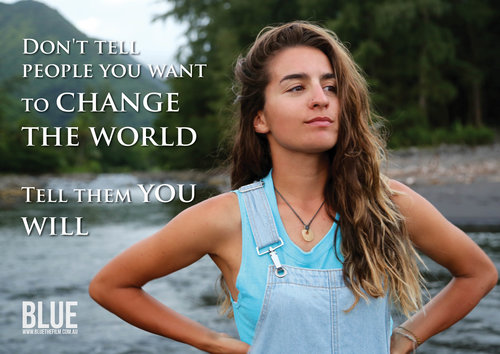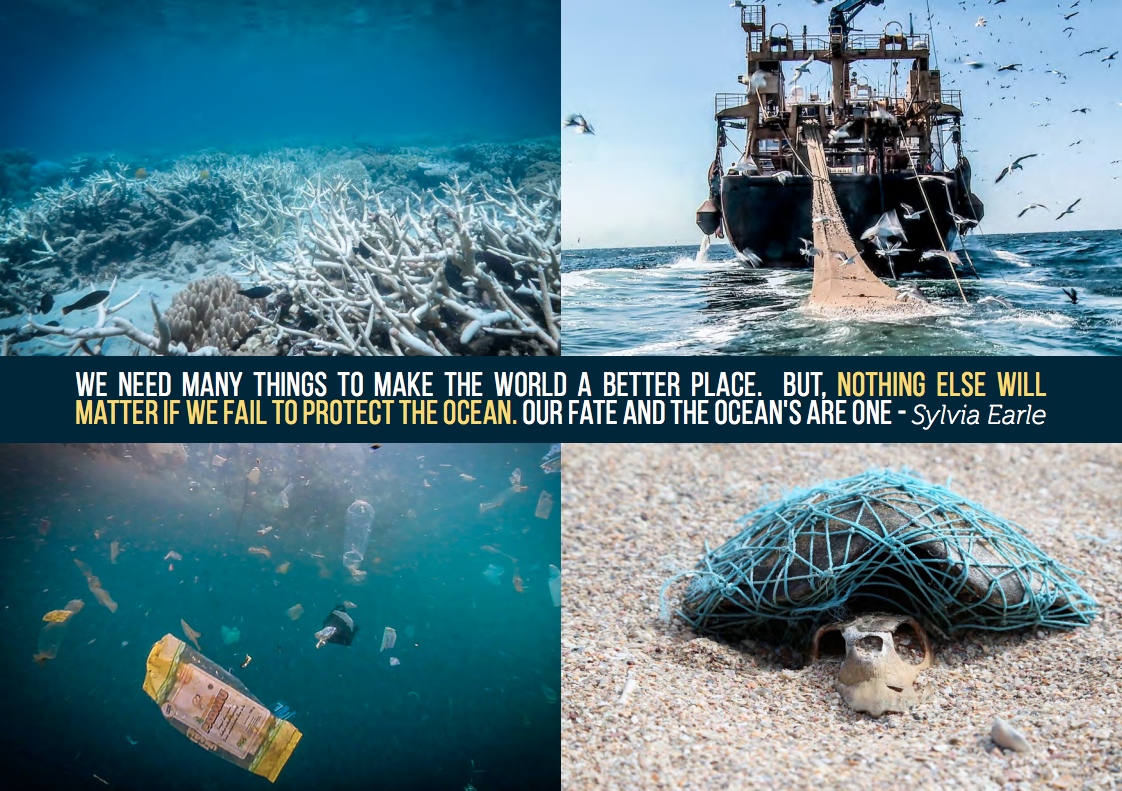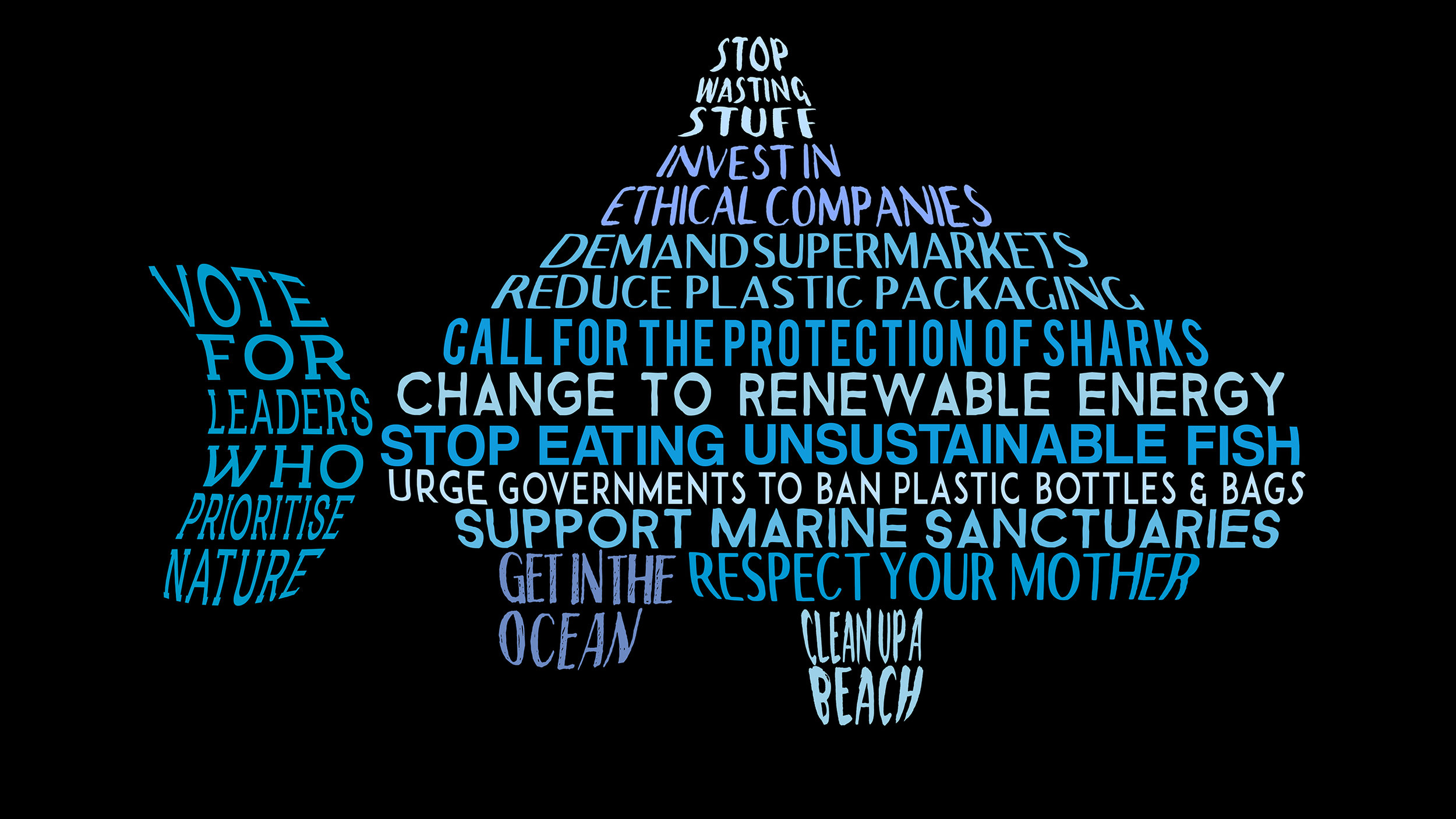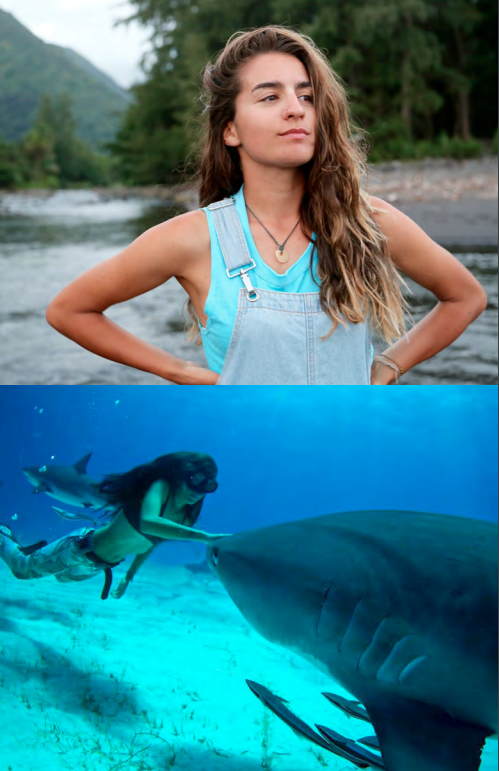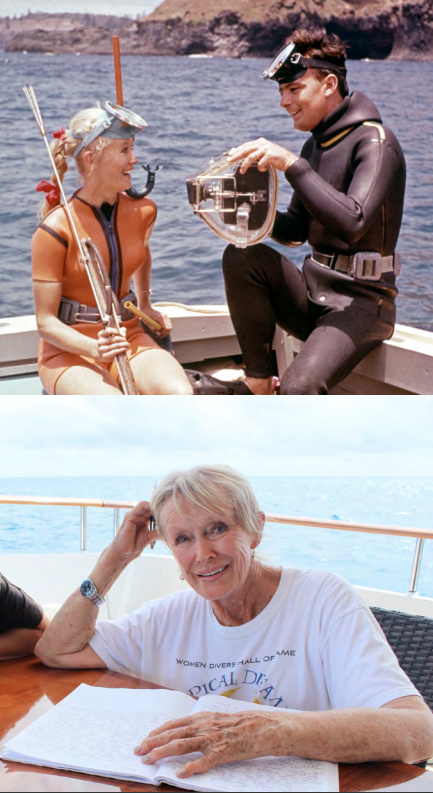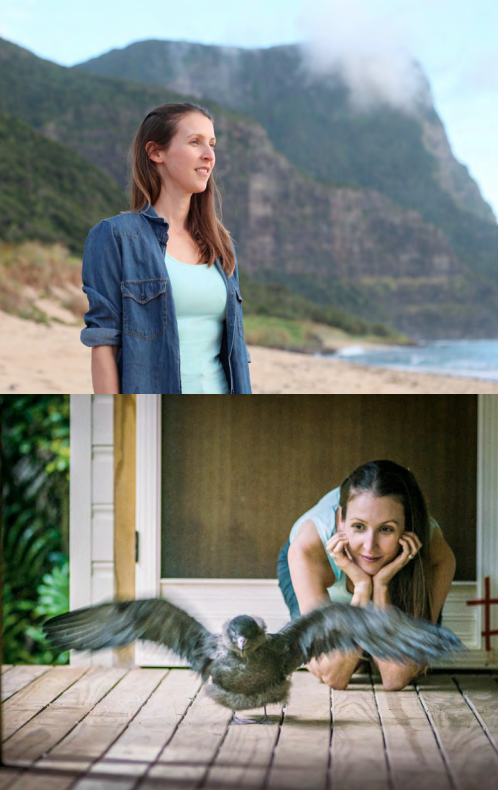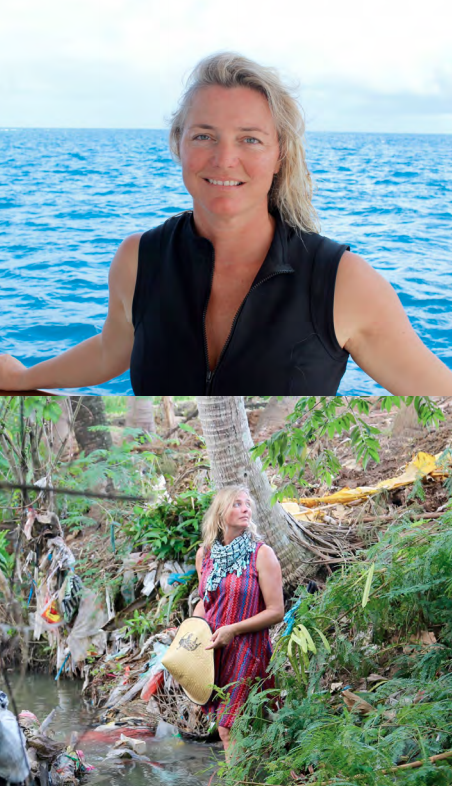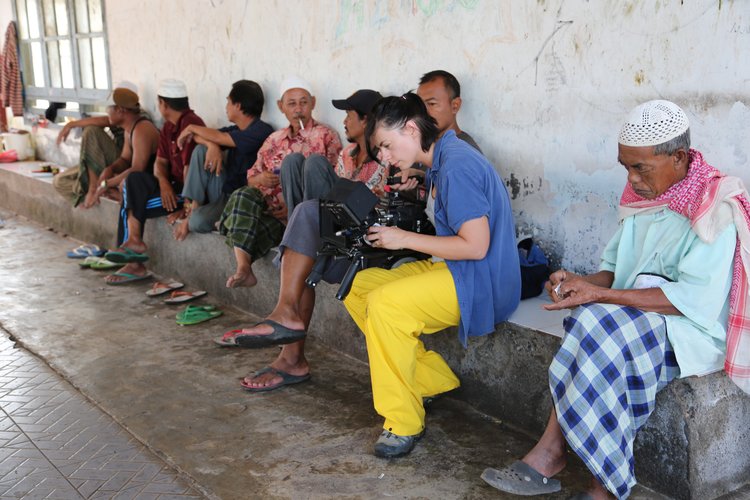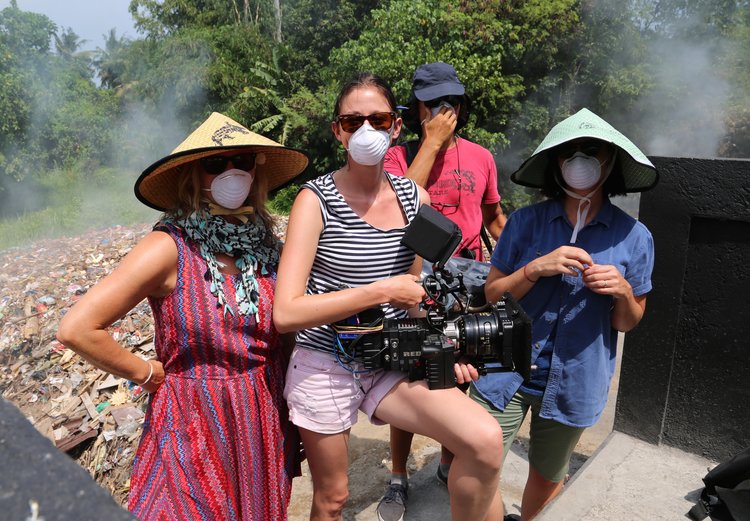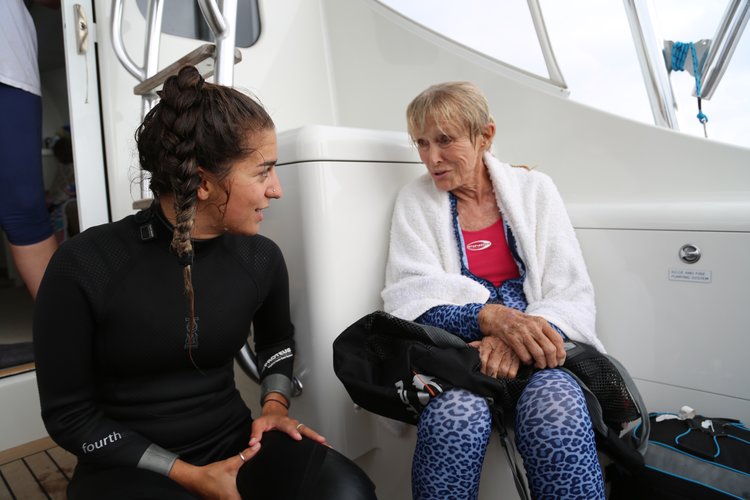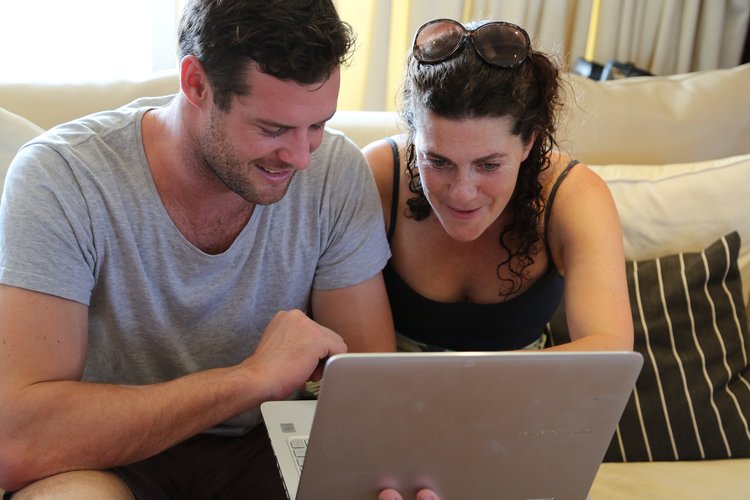| creative women with a conscience | Karina Holden filmmaker, scientist, story-teller, writer and director of 'BLUE' the film
All images are from: Blue the Film Website
“To my mind, watching BLUE is like diving. It is a descent into the unknown.
And it does become darker the deeper you go. But we return to the surface,
with hope and where it is light. And that first breath we take at the end of
the film feels restorative.
That is why BLUE is important. We need to delve into the darkness but feel
how possible it is to make change. We need a better grasp of how to live on
our finite planet, but also an understanding of how the future is something
we can all affect. ”
When our founder Natalie Shehata watched the exclusive screening of 'BLUE' the film before it's official cinema release, we knew we had to meet with Karina Holden director, filmmaker and scientist to get to know all about her life long mission to tell the stories of our natural environment. With a strong affinity for the ocean and our marine life, in her latest film 'BLUE', Karina balances the majestic and expansive beauty of the ocean with a story that needs to be seen and witnessed, so we as humans know our impact and the power behind each decision we make. Unlike any other documentary, this is a story of integrity and substance and how the oceans have served as our life force, for all of time. We now need to conserve our life force by choosing to be Ocean Guardians. Karina invites us on this journey of self awakening and leaves the future of the environment in our hands. It's up to us to make a difference now. The tide has come for change.
Source: Blue the Film Website
A lot of the women I speak with discuss the concept of having a strong moral compass and how this drives them to do the work that they do, and the origins of where this has stemmed from - whether it comes from childhood and you're upbringing, or it's something that has developed along the way. The things you personally care about and work towards are important, substantial issues - is this something that was instilled in you from a young age, caring about the environment?
My mother was definitely an earth mother growing up, we drove around in the mini moke with bare feet and went straight down to the beach and every weekend was spent in the bush; she'd make sure we hugged trees and got a sense of the importance of nature. We grew our own food and we had a weekend farm. There was this understanding of your connection and capacity, and the strength you have as an individual. There was never a sense that I wasn't capable in any context I was put in, so whether it was doing a 30km bush walk on the weekend and carrying your own pack or it was setting off to sail down the coast in the middle of a storm - my mother had cultivated this mentality of - this is life, hang on and engage. I think that was really important. Also I think I was quite motivated academically – I just wanted to be able to learn everything I could, so in some ways my mum and my father didn't have to put any pressure on me. It was all about rounding out my sisters and me as individuals. They taught us that it wasn’t all about focusing on one thing – they very much believed you could be somebody who had interests in nature or music or poetry or writing or whatever it is you were interested in.
There's often this stigma when pursuing the arts or creative fields that there's no money behind these industries, did you ever feel like there was pressure from your parents to make money?
Not really to make money, it wasn't a real emphasis in the family - it was more about being creatively fulfilled. But I know my mum was quite hesitant when I talked to her about story telling, drama, film and getting into journalism and film making - she was quite nervous about that – she thought, maybe if you go and do an arts degree, you'll just be like everybody else, so what's going to make you different? And she actually encouraged me to look at natural sciences and said to me you potentially have more of a speciality going forward by actually being a scientist and then wanting to becoming an artist, instead of wanting to be an artist and then becoming an artist. So she actually was the one who sort of helped shape my career. I loved the idea of being able to spend time in nature in order to have a job as well in beautiful and remote places and being able to protect them, so then it was like, well maybe those two interests can come together if you first become a scientist.
What drives you to tell this non-fiction story as a documentary filmmaker? Why is it that the truth and facts are important to get across?
There's still so much imagination in what I do [non-fiction], and it’s this idea of instilling creativity in a true story. I do think that the most amazing things you'll ever learn are probably the things that weren't made up. And the people you get to meet are more complex and charismatic then any other character you could write on paper, and sometimes, keeping it within the bounds of reality is more surprising than the fictitious, fairy dust that gets put on things - and that's where you see the twists and turns of real peoples lives and they open up to you. That's when it’s pretty powerful.
Source: Blue the Film Website
Is there a particular story along your travels that really stands out for you?
I think it really comes down to the role you're playing as a documentary film maker in these communities - you're coming into people's worlds and often they're telling their story to you, and you are witness to their story for the first time in a way that can be both cathartic, and can also change their own lives once they start to tell their stories like that. Whether it's people who have gone through major life changes because of the tribes they've come from or the experiences they've had in a mental institution - I've done some pretty crazy stuff over the years!
How do you feel as a woman in this industry and as a female filmmaker - did you ever feel like this was an issue given the filmmaking industry is generally dominated by men?
I actually think it’s a strength - I think the industry is difficult as it is, without having to consider gender. Everyone is struggling to find their niche and where the next project is going to be financed from - once you have finance then you're off and away. I've never seen it as an issue, and when it comes to my story telling, I've actually seen it as something where I've been able to transcend a lot of expectations, being a woman. A lot of my work has been in different parts of the world, and in different situations – whether that be living with a Maasai or working in these festivals in India where I’ve stayed with Saddhus; whatever situation it is, it’s almost like you’re this ‘other’ person…
Where there are no gender stereotypes?
Yes exactly, you engender this completely different reaction from people. I actually feel like people feel more safe with me and potentially more emotionally open and I build relationships within my films that I make, where I think being a female has massively helped. Anytime I've been in a difficult or dangerous situation, but still stood firm as a woman, I've had a lot of respect - and if you were a man in that situation it might have been a different story.
Was it a conscious decision to feature leading female change-makers in this documentary?
Yes, in the end we obviously had blokes in there as well - but there was something very powerful about challenging the balance we see so often with men on screen telling us stories. Sometimes I think women are easier to listen to and that blend, that mix is really important in order to infiltrate lots of different mind sets – instead of just going for the classic standard red blooded male point of view; I think it's important to diversify away from that.
Photo Source: Blue the Film Website
Was it also a conscious decision to feature younger people in the film?
Yeah - I think whenever you start a project you look at what's out there, and what your point of difference is and there definitely was this idea of staying away from the talking head interview situation where you had; powerful politicians, head of corporations and the leading scientist from a particular university - just going to a more grass roots level with younger, outspoken characters was really important.
Photo Source: Blue the Film Website
Your film ‘Blue’ was very unique in the sense that in the documentary you provide the truth and the facts behind what is happening to our oceans, which are just devastating - but after the film was over I was buzzing in my seat as all I wanted to do was take action – I felt very empowered and I felt liberated because you made the audience feel like we were powerful and impactful. Why were these positive messages and feelings important to communicate?
You need to make sure you don't leave an audience in a place of despair; despair is such a useless emotion, it's not going to get us anywhere, so you need to lead people to a place of action. At the same time, a classic narrative in a film would have a hero overcoming an obstacle and reaching this joyful climax and a classic Hollywood happy ending, yet I didn't feel like that was truthful either. We needed to work through the narrative of the film and the things that are going on and also look at what opportunities there are for change and how you can get involved – as well as a sense of empowerment of the individual to be part of that change and to then leave it with the audience - this is now part of your journey of what you're going to do. This was more than just telling a story, it was awakening truthfulness and awakening people’s relationship with the ocean.
Photo Source: Blue the Film Website
Why do you think that as a society and as humans we are disconnected from the ocean? Why do we think that we're somewhat invincible when it comes to our unconscious consumption - because the facts are there about how our use of plastic is harmful for the oceans – yet we also know what the ocean does for us as our life force. Do you think people are unaware and uneducated about what's happening with our oceans? Or is it that they just want to push it aside and not want to think and consider it?
I think it's quite easy to untether yourself from nature when you're working in a city and you're surrounded by an urban environment; increasingly we are urban creatures and we have everything come to us out of season and packaged up. We don't suffer hardships - we turn on the air conditioner when it's too hot and we turn on the electric blanket when it's too cold. We have coddled ourselves away from these natural forces, and every now and then a storm or a bushfire might come through and take us by surprise, but I think increasingly we've seen ourselves separate to nature. I think there is a lot of rhetoric about controlling nature; this idea of, its ‘man vs nature’, and its something we need to be seen as controlling - fundamentally we forget we are part of nature. We rely on natural systems and yet we see the degradation of those things as options – and to think that we have to choose between having something ecological or having something economical, and we can't have both, is kind of crazy. So short term, fast turn around politics, decisions made really quickly, consumerism, and drive to always be creating economic growth in a society, has separated us fundamentally.
Photo Source: Blue the Film Website
In terms of technology and innovation – what will help us with the future of our oceans and nature in general?
There's things you can point to whether they are technological advancements, the new materials we'll use instead of plastics, and the new things we'll use to clean the ocean up. When we move to renewables and stop burning fossil fuels, technological change will have a massive impact on the future of the oceans - how warm they get, how acidic they get, how dirty they get - but those things need to come from this place of humans wanting change. Technological advancements can only come from us being aware and putting these things into action by investing in R & D and voting for the need of technological change - anything is possible in our hands, so we need to decide to support the right things.
When I watched the exclusive screening of this there was a Q & A afterwards - you explained how important it was to have this film as a cinema release to be viewed on the big screen. I think this was a really important decision to make because of how we're consuming our tv & film these days in our homes - I feel as though as a society we are watching things not so much to learn, but to numb and for signing out at the end of the day, where you don't have to think a lot. Your film however is the complete opposite, you are so engaged and so 'on' whilst watching - there wasn't one time where I switched off. At the end of the film I just wanted to do more, and kept thinking ‘what else can I do to make change?’
Is this why it was important for you to have it on the big screen, so you can't ignore the truth and you have to stay engaged?
Absolutely, and I think the other thing is, when you’re working in television like I do, the pace and rhythm is very different; you have to shout a lot louder, be more aggressive, move faster and its attention grabbing. The kinds of things that we were able to do making this film were quite different to the TV model; we left room for the audience to find how they felt about what they were watching – you can’t do that in television, you’ve got to tell people what to think because they’ve switched channels if you’ve left too much time or stopped a narration for 20 seconds to just linger on an image. I think the other thing the cinema does is it holds you in that dark space and there’s something really beautiful about watching something about the planet we live on with other people around you.
Were there times throughout filming - or before the filming process, when you were in the ideas generation phase and you felt stuck about your message?
There was because of the scope of it – and because it wasn’t following a traditional story framework, so lots of doubts, but any time I felt that I would just go for a swim. I literally would just go and sit on the bottom of the ocean and I’d say I know you don’t have the answers for me, but if I hang out here hopefully something will permeate into my brain and I’ll know how to tell your story. I think that’s a normal part of whatever you’re doing, that there’s this doubt or hurdles and you need to learn to trust the process – the twists and turns of things that you have to stop and struggle with, and will eventually make whatever you’re creating better. I always say it to the people I work with, trust the process.
Do you feel like it’s very different to your vision initially?
It’s pretty close actually, I look back over notes that I’d just start scribbling down and it feels like it has that integrity that I set out with. Often that’s not the case because you’ve got some badass that comes in and starts stuffing with your show, but I didn’t have that. I can put this out into the world and know that it’s an honest representation of what I set out to do, and so love it or hate it, at least I can own it – it is what I wanted it to be.
I think its fantastic that you brought up the concept of integrity, because that’s something that’s really important to us here at tommie – I hear too often in the filmmaking business that when you get funding support, filmmakers have to compromise certain areas, do you think if you had to compromise on your vision you would have gone ahead with it?
It’s a very different model to normal, usually compromise is a normal part of the game in Broadcast television – so you learn to swallow the bitter pill sometimes. One thing I’m very protective of is the integrity of the people who are within the film, so we’d never compromise that. I’d always fight for that and that’s always something that I’ll always push back on if I’ve got somebody who’s trying to change my story in order to do something that is dishonest or not fair to the people who participated in the story telling. And I’ll make sure to stand up for them before I stand up for myself.
That’s so amazing, you’re very much about collaboration and protecting your community.
Yep, that’s all you got! You’ve got your reputation at the end of the day. I’ve seen filmmakers manipulate people and use them in order to make the content a more dramatic story and that would be very hard to live with for me.
I think filmmaking is one of the most popular mediums for collaboration – and I personally think you can only affect positive change individually to a certain point until you need other people to combine their efforts and creativity to create change. Do you ever feel like it is difficult to communicate your message when you are working with others?
No, I love it. Effectively, the producer who I worked on this project with [Blue the film], we’ve known each other for 20yrs. Sarah and I have worked on lots of different projects, we’re very close friends; even more so on this particular project because we were with each other day in and day out and we knew we were making something really important. She was unbelievably supportive, encouraging and permissive and just stoking fires anytime I had self doubts, so having a friend like that was just amazing. This was the same with everybody we worked with - having a female cinematographer who really wanted to stretch the way I saw things. I also had an amazing female editor, too.
Photo Source: Blue the Film Website
What advice would you give to an upcoming young, female filmmaker?
While technology has allowed us to be quite independent and be our own publishers and camera people and editors, I do think collaboration is really important and I think you have to be pretty realistic and start at the bottom and find some good people to work for and learn from them. I believe in that idea that you’re only as good as the people you learn from and from each opportunity grow. There’s a slight impatience with younger people these days that you need to have all these huge career milestones achieved and done by the time you’re 25– I think it’s great if you can achieve that, but we’re probably going to have careers that span 60 years or so these days – build on it and don’t see that you’re being held back if you’re not getting your first film directed by the time your twenty something. I don’t think I directed anything until I was thirty years old and I basically worked for six years before I got my first sort of break. It’s a long road and you have to hold it a little before you get to where you want - don’t be disillusioned especially in something like filmmaking. I look at the people who are the generations beyond me – like the Jane Campion’s, they worked and worked and worked and can sit on a platform where they are now, but I’m certainly not there. At 45 I’m not there, I’ve got a long way to go.
The very nature of making a film requires you to use a lot of resources, how did you and the team go about practicing what you preach, whilst making a movie?
We carbon offset all of our flights, minimising all of our transport options, having no plastic on location - our first location in Bali we bought all the crew stainless steel bottles so that we were drinking from refillables the whole time. All those small things – and just sitting down in the morning together instead of having everything as a take out option like a coffee into the field – we sat down to have breakfast with a plate and cup and we talked. This need for speed, need for inconvenience, eating while we’re working – I wanted to actually be together so we can talk and work out how we’re going to move forward for the rest of the day so we made sure to take proper breaks.
If you can be that mindful on a film set when you’ve got time constraints – you can do it in every day life!
What kind of things would you say you do as a daily routine or practice to slow down and make sure you’re not speeding too fast ahead? Are there certain kinds of rituals you have?
I don’t have work emails set up on my phone, which is crazy considering I now report to managers in London and Toronto. Keeping that away from my phone so it’s not something that’s constant - I can put my phone down at a certain time of day and leave it be. I always read a book to my son every night and we spend time just reading a story together – so that’s nice. Some slow down time. Because I live right along the coast at Fairlight, we’re in the water all the time – but I just can’t sit on the beach anymore and if I’m not in the water, I’m walking up and down cleaning the beach – I just can’t help it now. I just find it really rewarding as well and it feels like, in the action of doing something, this is really important. By all means I’m not going to solve this problem on my own – but if I see something in the sea and I take it out, I know it’s not going to get eaten by some fish or some bird and I just do my bit.
Is that how you feel you can keep going with perusing something that is so huge on your own – on days when its too hard, what are some things that keep you going?
Because the action of making a film in itself is optimistic, the making of the film never felt too hard – if you weren’t optimistic you wouldn’t finish it, so you do need to have that optimistic power! The other things like financing films or dealing with personality issues - those are the things that are hard. But the messages in the film, and the striving to tell the story and be part of seeing that change, don’t ever stop. So that’s what keeps you going.
Do you feel there’s still hope for storytelling, because it’s changed so much?
It’s quite interesting because when you step into other cultures there are certain people who are allowed to be the storytellers and everyone else is a consumer of that, not a creator. But it feels like we live in a very liberal society where we are allowed to have so much of our own voice, so as long as we’re critical thinkers, and we have a certain level of skepticism we will have story telling through different mediums and sources. I do just love listening to different people’s opinions and sorting out how I feel about it, by being open to stories from many people from different places and many point of views, because that’s our world. Different.
When you are overseas and it’s obviously very different to the western world – with women especially - what’s their association and connection to nature, what does it mean to them and how is it different to how woman here in the city would perceive nature?
It depends on where you are, there are obviously some people who I spend a lot of time with, like the Samburu where it’s everything – survival is based on nature. And if you’re not working in harmony with it, then it has dire consequences, and the awareness and the respect of nature is fascinating. That was one of the greatest gifts of my life - to spend time in those cultures. The lights go out when the sun goes down, lights come up when the sun comes up and you’re out working and you’ve got to collect your water. And when I do spend time overseas, its mainly with tribal or agrarian cultures, where it is getting back to nature because of the types of stories I’m going off to tell. So it’s what I can learn from those people, and there’s something quite nourishing about being in those environments.
What was one of your first experiences in a completely different culture?
I lived in Hanoi for a while in Vietnam and then I made quite a few films in Thailand – in rural Thailand - and that was really back to basics; we were literally staying in bamboo huts and eating crickets for dinner, really simple – and I loved it! It’s nice to be there - I couldn’t live there permanently - but those opportunities to be part of a culture like that and experience weeks of simplicity, where the phones are put away and you’re listening to stories and experiencing peoples way of life that is quite simple, is very nourishing.
Are they curious about your life and what’s it like on the other side of the world?
Nope, not at all.
I find that fascinating, and not surprising!
…sometimes curious about why as a female I’m there leading this team; in places like Japan I had a lot of curiosity about how I could become a leader as a woman amongst a crew of men.
In terms of female leadership, the dynamic is very different overseas, so these tribes and cultures would never have experienced a woman with that power and influence, is that correct?
I’ve only been in situations where I’ve been in patriarchal tribes, and yet the women - as I think they are in our society - are more powerful. There’s this weird understanding that people exist in this patriarchal structure, and yet there’s a lot of power amongst the women and fearful men about what the women are deciding to do.
So your newest documentary is called ‘Blue the film’ – was it a conscious decision to call it a film to steer away from stereotypical views of documentaries?
I love documentary, but I do also recognise there’s a real weakness when a lot of the genre is didactic, heavy and based on information being barraged at you. To me, it was actually looking at how much we could get away with not scripting it at all and just having this space in there where it became a very experiential cinema film - but it wasn’t a documentary like you’d think something on four corners is, or a current affairs programming and that was the point of difference - to move away from this.
You spoke about micro fibres briefly in the film – given I come from a fashion perspective – this particular area is something I am personally very interested in. Did you not touch on this as much as other areas because you felt it wasn’t as harmful as some of the other issues?
To be honest I think it’ s probably more harmful.
I don’t think people know yet about washing and what effects it has on our oceans..
I mean, we didn’t really when we started the film - we knew there was the issue of plastics breaking down and getting smaller and smaller within the food chain. There was the ‘Ban the Bead’ campaign that was coming out, but what was shocking was how much micro plastics were in toothpaste and cleaning scrubs. And then there’s what’s coming out about micro fibers and the importance of putting filters in your washing machine –a front loader produces 7 times less than a top loader – top loaders are a lot more polluting. So that’s all the kind of information that came out.
What’s the relationship between fashion, clothing and the ocean?
I like the idea that conservation can be cool and fashion needs to embrace that mentality shift too and move towards more sustainable fibres that don’t get into our oceans like synthetics.
I thought it was really great that Lucas had said in the Q & A after the screening that ‘caring can be cool’ - I think people my age group and in my circle want to see change – we want to make a difference. I think it’s an interesting time to be a younger person…
There are some models and actors speaking out about these environmental issues as a whole – and people are starting to see that it’s important. There’s people who are using their profile to actually do good work and pay attention to something more than just purchasing products and getting us to buy the next thing.
How do you shop for clothes?
I was like the classic ‘never bought anything’ person, when I was young - and I look at fast fashion now and can’t believe you can buy a dress for $20! When I was growing up I would go and buy fabric and sew my own clothes – and I loved that, I really loved sewing. I kind of wish I had a girl because I’d be sewing all these outfits for her!
You can sew boys things!
Oh, it’s nowhere near as interesting – I just loved sewing dresses, I used to literally sew a dress before I’d go out on a Friday night. I’d buy like 1.3metres of some fabric… I kind of miss those days! Also, I keep things forever - I used to transform my old school uniforms into clothing too, like off the shoulder gowns. There was something so satisfying about that. I don’t sew at the moment, and I can’t remember the last time I did, but I am the ‘never throw anything away’ person.
Do you buy new? Are you conscious of what you buy, does it have to tick certain criteria?
Sometimes I buy new. I like to know who and where I’m buying from, and I like going to my flea markets down in Manly, my second hand shops to look for treasures, I always share with friends and we [ Karina's sisters] do sister swaps.
When we’re talking about awakening people and taking action with the film, I guess one of the things I come across when I speak with people is that there is this mentality that hasn’t quite shifted yet, that what people do in their daily lives doesn’t impact the environment – that their use of plastics doesn’t effect the environment because they are ‘one person’. What would be your communication and messaging on this?
It comes down to the fact that the whole universe is made up of just one-person times the 4 billion we are now. We’re all individuals, and if we felt that way then we shouldn’t be given the right to vote. If we think that way nothing will ever be achieved – we are individuals, but it’s us individuals that make up communities and communities make up constituencies that make up nations - and so together we all count. The idea that we’re all perfect – scrap that! There is one foot we can put in front of the other everyday to make different choices and to achieve our goals and if we take things slowly. It’s not about a radical change of who you are; it’s about just starting to show more conscious awareness of what we’re doing and knowing that absolutely we all count. There’s just things you don’t have to do – you don’t have to take your coffee in a take away plastic coffee cup, you don’t have to wrap everything up in a plastic bag, you can keep reusable bags in the back of your car – these are simple things - like turning a light off when you leave a room. And also the choices where you’re choosing less waste and choosing to spend less money doesn’t mean you have to have a less convenient life.
tommie community event with exclusive screening of 'BLUE' the film & guest panel discussion
Come and join us for our first tommie community event with a private screening of 'Blue' the film, followed by an intimate conversation with special guests TBA shortly - hosted and moderated by eco stylist & founder, Natalie Shehata.
Through education, discussion and connection, these tommie events will help us lead more thoughtful and meaningful lives. We believe it is through open communication where change happens, and we aim to facilitate and curate these gatherings to provide an inclusive environment where all individuals are welcome to attend, no matter what stage of their journey.
Our discussion afterwards will address the topics of sustainability, slow living, eco fashion, conservation and anything else tommie guests would like to discuss. Thank you for your support, we hope to meet you all in person and see you at the cinema! Change starts with you, you change-maker!

